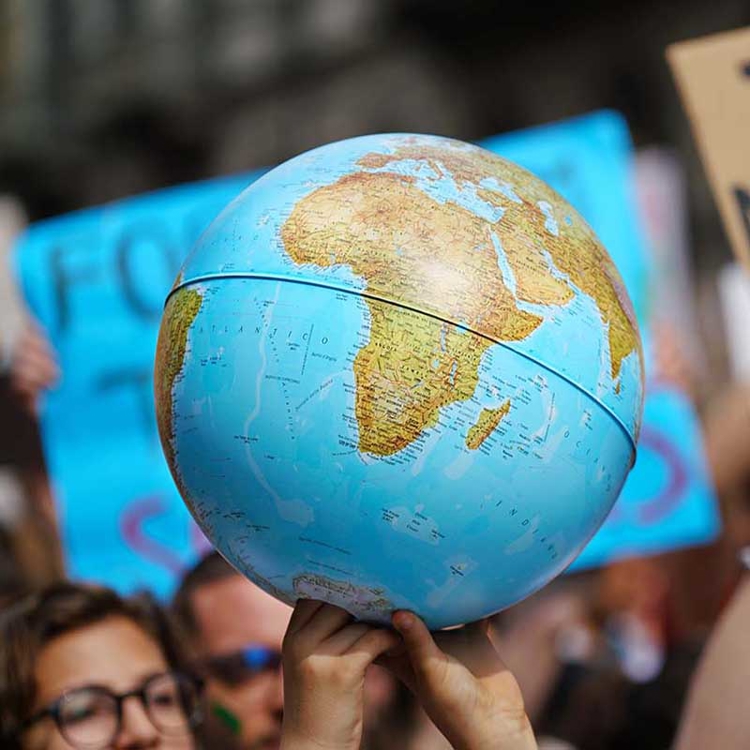Roehampton Climate Network
Informed Action on the Climate and Ecological Crises
Informed Action on the Climate and Ecological Crises
The University of Roehampton has a long-standing commitment to sustainability as an institution and a number of our academics, working across a diverse range of disciplines, have made climate action a key focus of their work.
Four professors have come together from across the University to lead the Roehampton Climate Network, raising the profile and urgency of knowledge creation and dissemination in this area.
The network will seek to organise public-facing events focused on staff research and showcase the research relating to the climate crisis being undertaken by Roehampton academics. It will also act as a focus for improving the University’s performance on reducing CO2 emissions and facilitating carbon-friendly lifestyles by our students. Here we will work alongside and in cooperation with the inspirational Growhampton project.

Anne is a freshwater community biologist with a focus on the ecology of tiny aquatic animals living in river sediments and groundwaters.
Our changing climate is expected to alter the frequency, intensity, duration and timing of extreme weather events and may result in unprecedented effects on river flow and riverine communities and, by extension, impact the ecosystem services that these systems deliver. Such extreme events may also increase the frequency of groundwater flooding, resulting in greater influxes of surface nutrients into aquifers with consequences for groundwater community structure, function and ecosystem service delivery. Climate change will result in higher temperatures in many parts of the world resulting in greater rates of groundwater abstraction for agricultural irrigation with unknown consequences for groundwater ecosystems.
Anne’s research aims to provide underpinning data on the responses of riverine sediment and groundwater communities to these changes, supporting and informing management strategies for these essential ecosystems.

Molly has focused her work on redesigning the economy so that it maximizes human well-being with the minimum use of energy and resources and without threatening other species and habitats. This led to her book Green Economics (2009) and culminated in her development of the idea of The Bioregional Economy (2011). She has championed the idea of environmental taxation, especially an upstream carbon tax on fossil fuels. She takes a critical position on the idea of climate finance, recognizing the need for well regulated private investment in climate solutions but wary of the risk that those in the majority world could lose control of their environments. Molly is also an expert in cooperative economics and has published on local economies and local food systems. She has direct policy experience supervising banking and sustainable finance as an MEP between 2014 and 2020.

Shelley Trower is active on a range of issues relating to environmental and climate crises. Academic publications and activities span from Place, Writing, and Voice in Oral History (2011) and Rocks of Nation (2015) to supporting the formation and development of the Oral History Society’s Environment and Climate Change group (2015-2021). Her most recent AHRC-funded project, Living Libraries (2019-2020), developed a key strand focusing on the role of libraries in contributing to a sustainable future. She has two projects focused on reading and the climate crisis. The first, ‘Reading and environmental action’, involves exploring how reading material (de)motivates environmental action. The other, ‘Public libraries and environmental action’, will investigate how libraries can best support environmental action, in collaboration with engaged actors including Libraries Connected.

Jérémie joined the Roehampton Law School in 2017 to establish our new LLM in Human Rights and Legal Practice, which includes a focus on climate litigation. As a human rights practitioner, Jérémie often works with indigenous peoples to support their legal claims to their lands and natural resources. He has been involved in providing legal briefs, expert opinions and carrying evidence gathering in several cases to support the rights of indigenous peoples’ in the context of climate change. He is leading an interdisciplinary research project focusing on the Rights of Nature, exploring how the recognition of the fundamental rights of natural entities and ecosystems could support a less human-centred approach to environmental governance, including a focus on climate policies and legislation.
